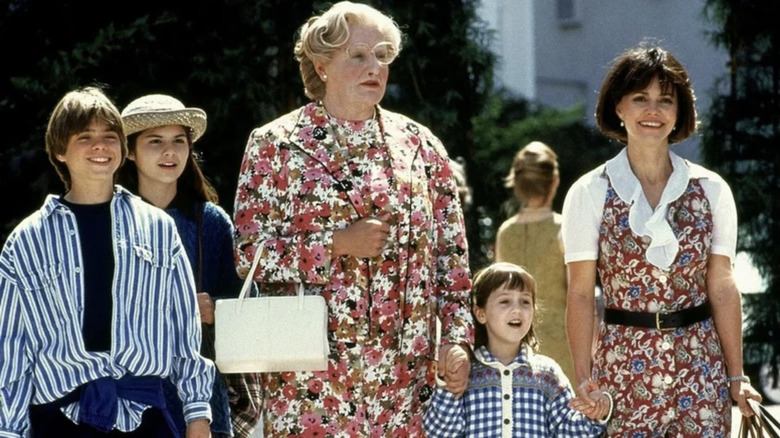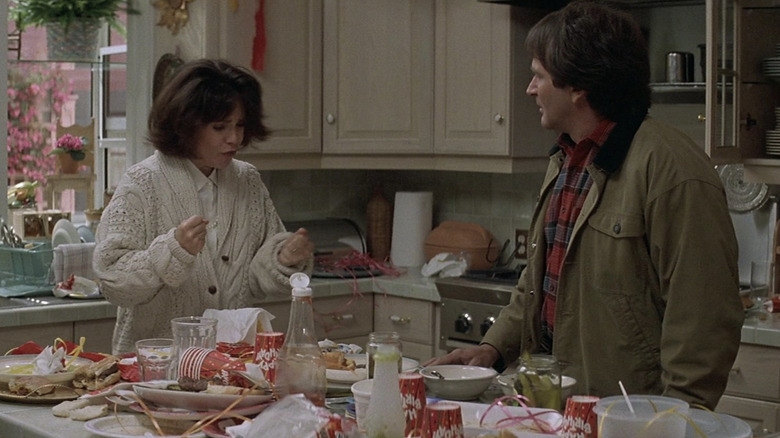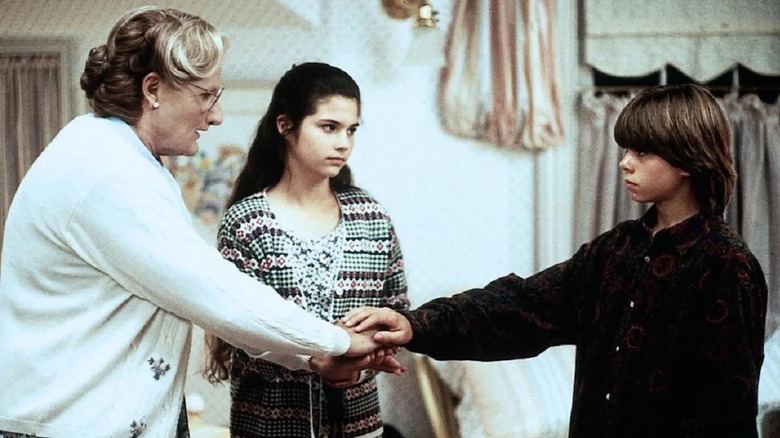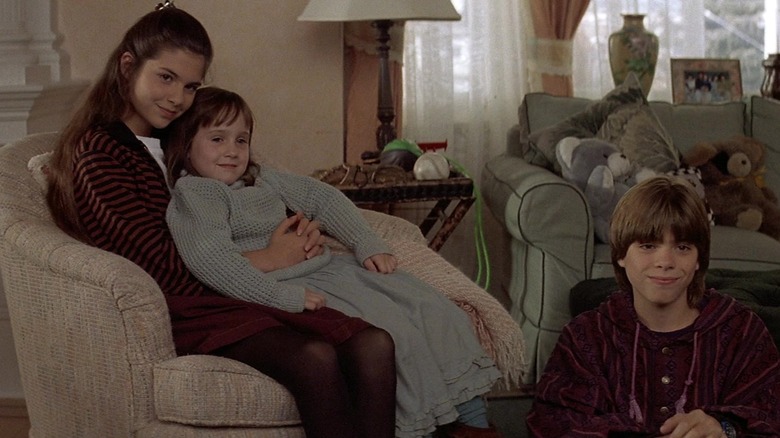Why Robin Williams Had To Change Mrs. Doubtfire's Original Ending
We may receive a commission on purchases made from links.
Director Chris Columbus' 1993 comedy "Mrs. Doubtfire" requires some suspension of disbelief from its audience. After all, its premise is pretty wacky: Divorced dad Daniel Hillard (Robin Williams) disguises himself as an elderly Scottish nanny in order to skirt a custody ruling and spend more time with his kids. But beneath that padded body suit and latex mask is a character with a lot of heart, and Williams' performance was rooted in his own personal experience navigating a divorce with a kid in the picture.
Before "Mrs. Doubtfire," probably the best-known family comedy about divorced parents and their kids was 1961's "The Parent Trap." In that story, two identical twins are reunited after being separated as babies, and concoct a scheme to make their parents fall in love again. They succeed in driving off their dad's horrible gold-digging fiancée, and the movie ends with a second wedding reuniting the twins' parents and putting them all back together again as a single, loving family unit.
"That's the one fantasy most psychiatrists will tell you is perpetuated by children of divorce who are in therapy," Robin Williams said (quoted in David Itzkoff's biography "Robin"). "And it's the one thing that the professionals don't want to perpetuate."
Daniel and his ex-wife, Miranda Hillard (Sally Field), are still divorced at the end of "Mrs. Doubtfire" — but in the script's original ending, the two of them got back together. Williams himself fought to change the ending from that understandable but unrealistic child's fantasy, to a more grounded portrayal of a family figuring out life after divorce.
Robin Williams went through a divorce before making Mrs. Doubtfire
A few years before making "Mrs. Doubtfire," Williams had been through a divorce from his first wife, Valerie Velardi. When they first separated, Williams and Velardi agreed to flexible shared custody of their four-year-old son, Zachary. Per a 1988 article in People magazine, Zachary lived with his mother in San Francisco but would spend as much time as possible with Williams whenever he was at home (which, given his career, wasn't as often as he'd like). The separation had been messy, but Williams emphasized that they were still a family:
"We all try hard to make the arrangement work. We all love Zachary, and Zachary loves us all [...] What I'm trying to do now is to work with Valerie to transform our marriage into a relationship in which we share Zachary and do all we can to make him happy. I expect my involvement with Valerie to go on until I die."
With this experience in mind, it's easy to understand why Williams didn't want to make "Mrs. Doubtfire" with its original, sugarcoated ending. Instead, he wanted it to be a movie "about real family values. After a divorce, how many fathers just give up? The tendency is to say, 'I love my son,' and then pull away. If you're lucky, the father becomes an uncle."
But Daniel Hillard doesn't just want to spend time with his children out of guilt or obligation; he genuinely enjoys being with them. "He needs his kids as much as they need him." Fortunately, director Chris Columbus was on the same page as Williams, agreeing that Daniel and Miranda getting back together was "the biggest problem" with the "Mrs. Doubtfire" script. And like Williams, Columbus connected with Daniel's longing to spend more time with his children: "In our hearts, we'd love to be Robin's character in the movie. To be the ultimate father 12 hours a day, to stay home and play with the kids."
The problem with Mrs. Doubtfire's original ending
The fight against the original ending of "Mrs. Doubtfire" wasn't a prolonged one, according to Columbus, who told Business Insider, "Robin, Marsha [Graces Williams, Robin's second wife and a producer on the movie], and myself, we were a strong trio about that. We were adamant with the studio that they would never get back together." According to Graces, though (quoted in Itzkoff's "Robin"), their opinion wasn't a popular one at the time: "Everybody — our managers, our agents, people at the studio — said that the audience would want Daniel and Miranda to get back together, or, at least, to leave their situation up in the air."
The reflexive urge to give the story a "happy" ending by getting Daniel and Miranda back together was so strong that it didn't even end after the movie came out, according to Columbus:
"I remember in the early stages of the Broadway show, I was talking to one of the writers and we got into an argument over the phone because he said he was going to write Daniel and Miranda getting back together. I was like, 'How can you do that? It's just wrong.' It gives the wrong message to kids all around the world. We wanted those kids to feel that they were seen and heard because, in most movies up until that point, the parents always get back together."
Mrs. Doubtfire's cast reflects on the movie's message, 25 years later
In 2018, "Mrs. Doubtfire" star Pierce Brosnan — who played Miranda's charming new beau, Stuart — was reunited on NBC's Today with Mara Wilson, Lisa Jakub, and Matthew Lawrence, who played the three Hillard kids. Reflecting on the success of "Mrs. Doubtfire" and its enduring relevance, Brosnan said that the unique message of the movie was "very empowering for young men or women or families who are going through a disruptive time in life, that of divorce. It is a very healing film in many ways."
Later in the same interview, Jakub credits "Mrs. Doubtfire" with being brave enough to tackle the topic of divorce in a way that movies hadn't done before:
"It really showed that there are different versions of a happy ending, and that families might look different, people might live differently than you. But when there's love, when there's acceptance, all of those things, it's going to be okay. And I think that continues to be a really powerful message for people."
In the final scene of "Mrs. Doubtfire," Daniel's nanny character — who now has her own TV show — responds to a letter from a little girl whose parents have split up. This gives Williams an opportunity to speak directly to the audience, and to send that important message to any children of separated parents who might be watching. "Some parents, when they're angry, they get along much better when they don't live together," Mrs. Doubtfire explains gently. "And sometimes they get back together. And sometimes they don't, dear. And if they don't, don't blame yourself. Just because they don't love each other anymore, doesn't mean that they don't love you."
"Mrs. Doubtfire" is available for rent or purchase on Prime Video.



